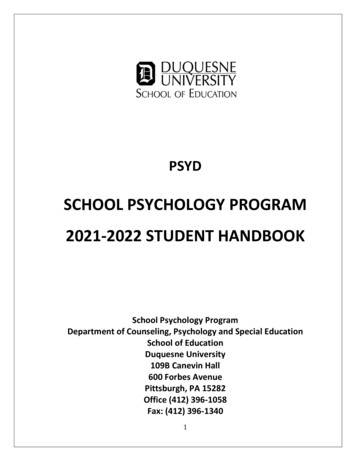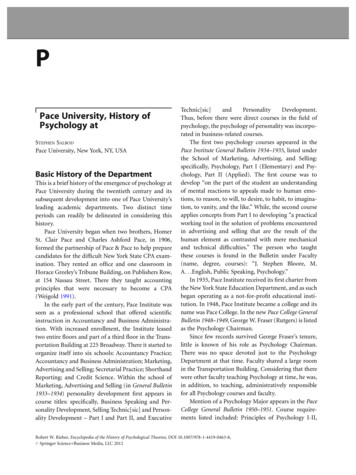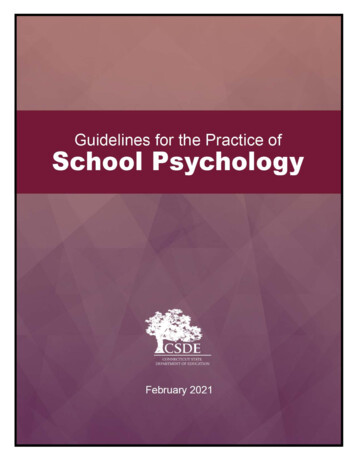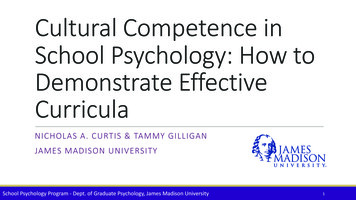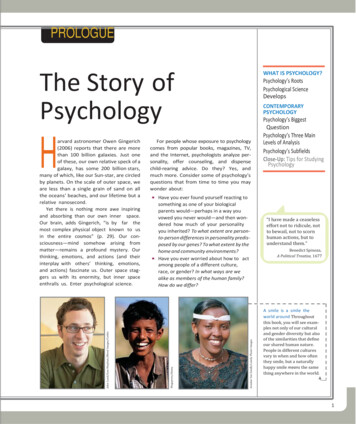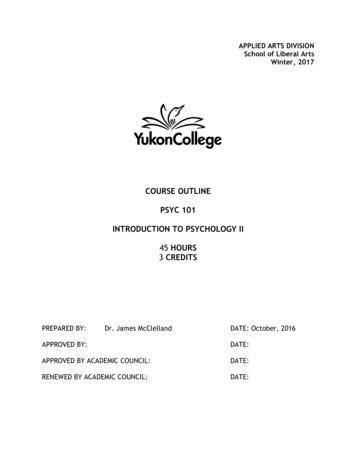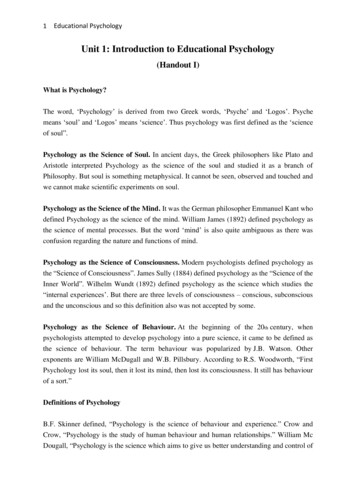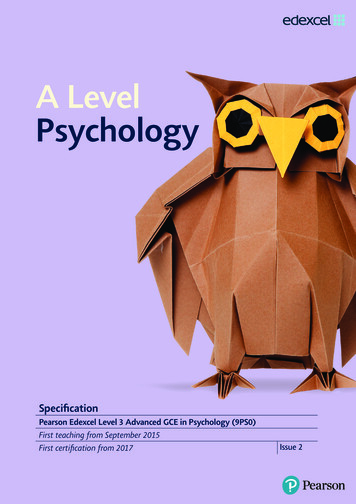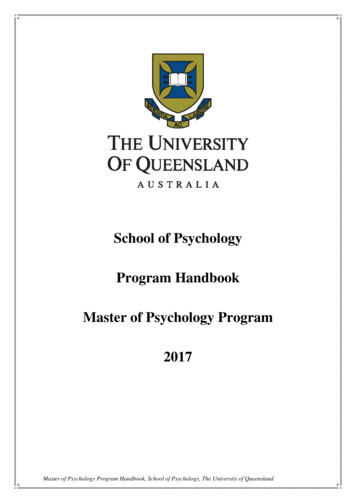
Transcription
School of PsychologyProgram HandbookMaster of Psychology Program2017Master of Psychology Program Handbook, School of Psychology, The University of Queensland
Table of ContentsIntroduction . 1What is Psychology? . 1Counselling Psychologists . 1Health Psychologists . 1Sport and Exercise Psychologists . 2Clinical Neuropsychology . 2General Facilities and Support . 2Computing Facilities . 2Psychology Resource Centre . 2UQ Library & Contact your Research Information Service Librarian . 3Master of Psychology Program Staff . 4Key Contacts . 4Lecturing Staff . 5Counselling Psychology. 5Health Psychology . 5Sport and Exercise Psychology. 6Clinical Neuropsychology . 6Ethics . . 6Assessment . 6Competencies for Psychologists . 9Professional Recognition . 13The Psychology Board of Australia (PsyBA) . 13Australian Psychological Society (APS) . 13APS College of Counselling Psychologists . 14APS College of Health Psychologists . 14APS College of Sport and Exercise Psychologists . 14Master of Psychology Steering Committee . 14Program of study for Master of Applied Psychology . 15Recommended Sequence of Study: Counselling stream . 15Recommended Sequence of Study: Health stream . 16Recommended Sequence of Study: Sport and Exercise stream. 17Recommended Sequence of Study: Clinical Neuropsychology stream . 19Requirements of the Program . 19University Guidelines . 19Coursework Attendance Requirements. 19Credit for Previous Courses Undertaken . 20Master of Psychology Placement Program . 20Master of Psychology Thesis Information . 22Important Stages for Thesis Progress and Submission . 22Overview of Master of Psychology Thesis . 23Suitable and Unsuitable Projects . 23What Is An Appropriate Project? . 24Problematic Projects . 24Potentially Risky Projects . 25Scope . 25Supervision of the Master of Psychology Thesis . .25Supervision Process . 25Designing the Project . 26Master of Psychology Program Handbook, School of Psychology, The University of Queensland
Supervisor’s Reading of Drafts . 26Supervisor’s Contribution to Parts of the Thesis . 26Data Collection . 26Statistical Analyses . 27Discussion of Results . 27Problems in the Supervision Process . 27Codes of Professional Conduct and Research Ethics . 27Ethical Clearance for Conducting Research in Psychology . 28Potential Ethical Issues or Problems . 28Working with Children Security Clearance . 28Writing the Thesis . 29Length Limit for the Thesis . 30Editorial Style . 30Science, Academic Integrity, and Professional Conduct . 31Acknowledgement of Sources . 31Data Management and Record Keeping . 31Data and Output from Statistical Analyses . 32Thesis Format Summary Checklist . 33Submitting the Thesis . 34Time . 34Thesis Extensions. 34Copies . 34Marking the Thesis . 34Data and Publication of Student Theses . 34Additional Information . 35Master of Psychology Program Handbook, School of Psychology, The University of Queensland
1IntroductionWelcome to postgraduate study in the Master of Psychology program at The University ofQueensland! Congratulations on being selected for this program. This Program Handbookhas been designed to assist postgraduate students in understanding the requirements of ourprogram. It is designed to provide students with information about: Objectives and goals guiding the program and course structure; Support and resources provided by the School of Psychology; Staff members teaching in the Master of Psychology program; Important administrative and supplementary information; Expectations of you as a student training to be a psychologist (in the field ofCounselling Psychology, Health Psychology, Sport and Exercise Psychology orClinical Neuropsychology).What is Psychology as we see it in this program?The basic goal in psychology is to use psychological principles and theories to overcomeproblems in areas, such as mental health, education, health, relationships, life transitions, andlaw. The staff and professionals involved in the Master of Psychology program arepassionate about using psychological theory and research findings to solve real-worldproblems. The program has four specialty streams: Counselling Psychology Health Psychology Sport and Exercise Psychology Clinical NeuropsychologyCounselling PsychologistsCounselling psychologists use a diverse range of therapeutic methods, each of which places astrong emphasis on the quality of the relationship between the client and the psychologist.Counselling psychologists help individuals, families, and groups in areas related to personalwellbeing, interpersonal relationships, work, recreation, and health. They are trained to assistpeople who are experiencing both acute and chronic life crises.Health PsychologistsHealth psychologists are specialists in health behaviour change. Health psychologyinvestigates the links between psychological and social factors, and physical health toimprove health and prevent illness. Health psychologists practise in two main areas - healthpromotion and clinical health psychology. Health promotion involves the prevention ofillness and the promotion of health-related behaviours. Clinical health psychology involvesMaster of Psychology Program Handbook, School of Psychology, The University of Queensland
2the application of psychological principles to the assessment and treatment of illness, and torehabilitation.Sport and Exercise PsychologistsSport and Exercise psychologists are interested in how participation in sport, exercise, andphysical activity may enhance personal development and wellbeing throughout the lifespan,as well as how psychological factors can influence participation, performance, and wellbeing.In practice sport psychologists apply specialised knowledge to understand and then positivelyinfluence behaviour in sport, exercise, and performance settings. They work across a widerange of settings from assisting individuals with reduced performance due to emotionaldifficulties through to team settings assisting sporting organisations with cognitive andbehavioural strategies for recovery. Such psychologists find employment in public- andprivate-sector organisations, consultancy firms, private practices, universities, and not-forprofit community organisations.Clinical NeuropsychologistsClinical neuropsychologists provide assessments and treatment recommendations for peopleexperiencing difficulties with memory, learning, attention, language, reading, problemsolving, decision-making or other aspects of behaviour and thinking abilities.Neuropsychologists also provide treatment that may employ cognitive, educational,behavioural or psychosocial methods.(APS: )General Facilities and SupportComputing FacilitiesShared desks and computer facilities for all Postgraduate Coursework Students in the Schoolof Psychology are located in Rooms S202 and S228. The Postgraduate Printer andPhotocopier room is located in S207. These rooms are accessible via a swipe card systemand access is granted automatically each semester, however, if you don’t have access pleasecontact pgenq@psy.uq.edu.au or (07) 3365 4919. For further information about computingfacilities, contact ITS (IT Services) on help@its.uq.edu.au.Psychology Resource CentreThe Psychology Resource Centre stores the psychological test library (Room 24A-206),which has over 300 psychological tests and associated user manuals. For further informationabout accessing and borrowing testing materials, contact Ms Danico Jones onpsyresource@psy.uq.edu.au.Master of Psychology Program Handbook, School of Psychology, The University of Queensland
3UQ Library & Contact your Research Information Service LibrarianThe University Library also offers free workshops, from sessions on using the catalogue anddatabases, to more advanced classes on citation searching, using Endnote, alerting services,and more. Please check out the Training Sessions page at the following e Library offers a wealth of resources, in print and online, to support your study andresearch. Currently the collection provides approximately 2 million volumes, 85,000journals, 900 databases, 500,000 ebooks, and 30,000 DVDs. Come on a Library tour at thestart of semester, or view the virtual tour at: Generous borrowing privileges are provided for all students and staff. If you need access to abook or article not held in UQ Library, you can request it through the Library’s DocumentDelivery Service, and it will be obtained for you from another Library. Use the onlinerequest form at: /request-documentdeliveryDuring semester, the Social Sciences and Humanities Library (which houses mostPsychology publications) is open 7 days per week, and the Biological Sciences Library isopen 24/7, providing computer access and study space.The University Library’s Multimedia Service http://www.library.uq.edu.au/tals/mm/ providesaudio and visual resources, including over 30,000 DVDs and videos, for borrowing andonline.To book materials for teaching purposes, ring x64318 or email:avsbook@library.uq.edu.au Bookings can be made up to 6 months in advance. Requestsfrom the National Film Library require at least 10 working days’ notice. All UQ Libraryaudio visual material is listed in the Library catalogue.Many videos are now available through the Library website in digital form, and can beviewed from anywhere by UQ staff and students. Digital videos can also be linked toBlackboard courses. Collections of online videos relevant to Psychology include Counsellingand Therapy in Video I and II, and the Australian database TVNews. TV programmesrecorded off-air by the Library can also be made available in digital form for teachingpurposes.The Library provides a wide range of support for both coursework and research students.Information especially for researchers can be found ostgraduate students are welcome to make an appointment to meet individually with alibrarian from the Research Information Service, to look at Library resources and techniquesrelevant to your topic area. Contact Miranda Newell on m.newell@library.uq.edu.au.Master of Psychology Program Handbook, School of Psychology, The University of Queensland
4Master of Psychology Program StaffKey ContactsProgram DirectorAssociate Professor Judith MurrayRoom 405, McElwain Building (24A)Phone: (07) 3365 7181Email: judith.murray@uq.edu.auDeputy Program DirectorAssociate Professor Stephanie HanrahanRoom 504, School Human Movements & Nutritional Sciences (HMNS Building 26B)Phone: (07) 3365 6453Email: sjh@psy.uq.edu.auPlacement Manager (Counselling and General Psychology)Ms Gillian McGregorRoom 121, McElwain Building (24A) (Monday to Friday)Phone: (07) 3346 9513Email: g.mcgregor1@uq.edu.auPlacement Manager (Health Psychology)Ms Carly LeveringtonRoom 121, McElwain Building (24A) (Monday, Tuesday and alternate Wednesdays)Phone: (07) 3346 9513Email: c.leverington@uq.edu.auPlacement Manager (Sport and Exercise Psychology)Mr Nathan SeefeldRoom 230, School Human Movements & Nutritional Sciences (26B) (Monday, Tuesday andFriday)Phone: (07) 3365 6987Email: n.seefeld@uq.edu.auPostgraduate AdministratorMs Rachelle CrotonLevel 3, Psychology Reception, McElwain Building (24A)Phone: (07) 3365 4919Email: r.croton@uq.edu.auMaster of Psychology Program Handbook, School of Psychology, The University of Queensland
5Psychology Clinic ManagerDr Leander MitchellRoom s214, Social Science Building (24)Phone: (07) 3365 6451Email: leander@psy.uq.edu.auLecturing StaffCounselling PsychologyDr James KirbyRoom 332, McElwain Building (24A)Phone: (07) 336 56802Email: j.kirby@psy.uq.edu.auAssociate Professor Judith MurrayRoom 405, McElwain Building (24A)Phone: (07) 3365 7181Email: judith.murray@uq.edu.auProfessor Kim HalfordRoom 334, McElwain Building (24A)Phone: (07) 3365 6375Email: k.halford@psy.uq.edu.auDr Jennifer FitzgeraldRoom: School of MedicinePhone: (07) 336 55140Email: jenny.fitzgerald@uq.edu.auHealth PsychologyDr Tegan CruwysRoom 135, McElwain Building (24A)Phone: (07) 3346 9504Email: t.cruwys@uq.edu.auProfessor Christina LeeRoom 428, Social Sciences Building (24)Room 233, McElwain Building (24A)Phone: (07) 3365 4910Email: c.lee@psy.uq.edu.auMaster of Psychology Program Handbook, School of Psychology, The University of Queensland
6Professor Cath HaslamRoom 234, McElwain Building (24A)Phone: (07) 3346 7565Email: c.haslam@uq.edu.auSport and Exercise PsychologyAssociate Professor Stephanie HanrahanRoom 504, School Human Movements & Nutritional Sciences (HMNS Building 26B)Phone: (07) 3365 6453Email: sjh@psy.uq.edu.auProfessor Cliff MallettRoom 507, School Human Movements & Nutritional Sciences (HMNS Building 26B)Phone: (07) 3365 6765Email: cmallett@hms.uq.edu.auMr Nathan SeefeldRoom 230, School Human Movements & Nutritional Sciences (HMS Building 26B)(Monday, Tuesday and Friday)Phone: (07) 3365 6987Email: n.seefeld@uq.edu.auClinical NeuropsychologyDr Gail RobinsonRoom 412, McElwain Psychology Building (24A)Phone: (07) 3365 6401Email: g.robinson@psy.uq.edu.auEthicsDr Jeanie SheffieldRoom 122, McElwain Building (24A)Phone: (07) 3365 6690Email: jeanie@psy.uq.edu.auAssessmentDr Alan PegnaRoom 460, McElwain Building (24A)Phone: 07 3365 6412Email: a.pegna@uq.edu.auMaster of Psychology Program Handbook, School of Psychology, The University of Queensland
7Outline of the UQ Master of Psychology programThe Master of Psychology Program (MPsych) is a postgraduate program of the School ofPsychology that prepares students to become registered psychologists in Australia throughthe Australian Health Practitioners Regulation Agency (AHPRA). It also offers a pathtoward specialist endorsement in one of four areas: Counselling PsychologyHealth PsychologySport and Exercise PsychologyClinical NeuropsychologyThe objective of the Master of Psychology program is to provide ways for individuals topursue professional careers in psychology via postgraduate education. The programrecognises that people who choose to study psychology may be interested in a number ofspecialty areas. The program provides specialist training in four fields: counsellingpsychology, health psychology, sport and exercise psychology, and clinical neuropsychology.The Master of Psychology program aims to produce high-quality psychologists with strongresearch abilities, who are capable of putting their skills into practice in a variety of settings,including public and private sector organisations, universities, private practices, and not-forprofit community organisations. The program combines academic learning, a researchorientation to problem solving, and practical experience.Our program trains students in the use of the scientist-practitioner model in their professionalwork. Within this model, theory, research, and practice are combined to develop professionalskills in a range of areas. A critical mind and the ability to evaluate evidence are vital to theeffective practice of counselling, health, sport psychology and clinical neuropsychology.A number of shared foundations and approaches within the Master of Psychology allowfour different areas to not only sit comfortably together, but to complement each other andinnovate through embracing the richness of both our commonality and diversity.What are these shared foundations and approaches within the Master of Psychology? The MPsych is a professional practice program in which it is ‘Psychologist First –Specialty Second’The MPsych takes as its first priority to develop competent and respectful professionalswho are able to practice effectively as psychologists. Hence all students in the programdevelop foundational knowledge and competencies in all areas of practice as required for apsychologist. These include interpersonal skills, ethical practice, a scientist-practitionerapproach, and evidence-based psychological assessment and intervention. The Master ofMaster of Psychology Program Handbook, School of Psychology, The University of Queensland
8Psychology program then allows each area of Psychology to develop its specialistknowledge and skills within varied specialist courses and placements. Respecting and upholding of the diversity of the Psychology professionThe MPsych recognizes and upholds that the profession of psychology embraces manydifferent areas of expertise and caters for many different people in a variety of settings andat various levels of care. No one specialty area of psychology can adequately address allneeds. As such, the diversity in the psychology profession has evolved. The Master ofPsychology program celebrates this diversity, recognizing that competition between thespecialties or dominance of one approach does not offer to the community the richness thatpsychology as a profession can bring. Integrative Approaches in Theory, Practice and ResearchEvidence points to the fact that many different theories and interventions are effective inthe support of the wellbeing of individuals, groups and communities. Complex problemsrequire a broad consideration of a person’s experience which is best served by adopting anintegrative approach to theory, practice and research. Rather than just using a number ofdifferent approaches, the Master of Psychology program seeks to consider how analysisand synthesis of different approaches can best meet the diverse needs of individuals HolisticThe Master of Psychology program emphasises a holistic approach to the needs of peoplefor whom we care. The program encourages consideration of the interactions of manydifferent aspects of a person’s life within their difficulties and hence encouragesconsideration of varied approaches to care. Person-driven and responsiveThe identification of the needs and provision of care are centrally located within the personof the client, group or community. Ascertaining these needs from the perspective of theclient, and designing collaborative approaches to care are central to the approach of theMaster of Psychology program. The approach is dynamic, being responsive to the changingneeds of the client. Interprofessional respect and building of interprofessional relationshipsIn recognizing that the well-being of each individual is influenced by many factors(biological, psychological, social, spiritual), the Master of Psychology program encouragesthe emerging practitioner to understand the work of, respect fully, and work cooperativelyand innovatively with, different professionals in various disciplines and sectors such aswelfare, health, education and justice.Master of Psychology Program Handbook, School of Psychology, The University of Queensland
9 Importance of self-reflection and self-awarenessWithin the Master of Psychology program the evidence for the important role of the personof the psychologist as well as reflection in the practice of effective care is recognized. As aresult, self-awareness, reflection on practice, and ongoing personal development areactively encouraged. Strengths-based approachWhile the Master of Psychology program recognizes and trains practitioners in theknowledge, assessment and intervention with psychopathology, it also recognizes theimportance of the use of client and community strengths to care for mental health concerns. Expertise in treatment but with a strong emphasis also on prevention, promotion andearly interventionThe Master of Psychology program recognises that health and wellbeing evolves across thelifespan and is commonly related to pressures within a person’s past and present life.Further, it is understood that many difficulties people face may not constitute a mentalillness and that people may or may not seek assistance at many stages in the developmentof a problem. The Master of Psychology program values approaches to care that emphasisepromotion, prevention, and early intervention, as well as treatment. Evidence-based practice embracing all three elements of EBP: Empirically supportedtreatments (ESTs), clinical wisdom and contextualisation of the clientEBP has been defined as the integration of best research evidence with clinical expertiseand patient values to facilitate clinical decision making (DiCenso, Guyatt & Cliska, 2005,p.4). As such, EBP values the integration of empirically supported treatments, thedevelopment of clinical skills in real life settings, and a recognition of the vital role of thecontextualisation of the needs of the client in any effective care. The Master of Psychologyprogram seeks to develop knowledge and skills within the emerging practitioner that willenhance the offering of EBP within individual practice and the broader community.(Reference: DiCenso, A., Guyatt, G., & Cliska, D. (2005). Introduction: Evidencebased nursing. In A. DiCenso, G Guyatt, & D. Cliska,(Eds.) Evidence-based nursing:a guide to clinical practice (pp. 3-19). St Louis: Elsevier Mosby) Core ProfessionalCompetencies for PsychologistsThe learning experiences offered in the Master of Psychology program (through coursework,research, and placements) are designed to provide opportunities for students to develop theeight core professional competencies necessary for general registration as a psychologist inAustralia. These eight competencies are:1.Knowledge of the DisciplineMaster of Psychology Program Handbook, School of Psychology, The University of Queensland
102.3.4.5.6.7.8.Psychological Assessment and MeasurementIntervention StrategiesResearch and EvaluationCommunication and Interpersonal RelationshipsEthical, Legal, and Professional MattersWorking within a Cross-Cultural ContextPractice across the LifespanExtensive information about these competencies is provided in the Master of PsychologyPlacement Handbook.Fitness to PractiseThe University of Queensland (UQ) through the Master of Psychology program has aresponsibility to our professional organizations and more importantly, to the people in thecommunity for whom we care, to ensure that our graduates have skills, behaviours andattitudes that equip them to work responsibly, competently and respectfully as psychologistswithin Australia. As such we are charged with the responsibility to ensure that students are fitto practise.The PPL 3.30.14 Fitness to Practise Policy and Procedures are designed primarily asprotection for all from practice that may be harmful to clients, colleagues, co-workers and/orthe student alike.What does it mean to be ‘Fit to Practise’?A student needs to show that he or she is able to meet the standards that are expected of aperson who is fit to work as a psychologist. The University of QLD policy states that thepolicy and procedures has been developed to: Guide the management of cases where astudent undertaking a program that has a practical placement component has exhibitedbehaviour that has given cause for concern as to their Fitness to Practise in that program.(Section 1.4 Policy)Being fit to practise is considered in terms of a range of factors that according to the policyinclude:a)Engaging in conduct outside the bounds of that considered acceptable or worthy of themembership of the profession (conduct); and/orDemonstrating performance that is not
Introduction Welcome to postgraduate study in the Master of Psychology program at The University of Queensland! Congratulations on being selected for this program. This Program Handbook . Counselling Psychology, Health Psychology, Sport and Exercise
